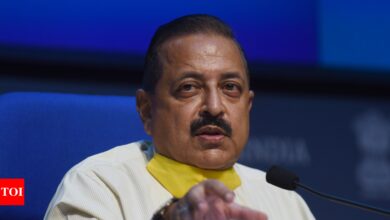India
How govt machinery moved to help tribal students in Gondia crack IIT-JEE code | India News

[ad_1]
A regular summer vacation for 18-year-old Sonam Sahala would involve working in the fields in her remote village in Maharashtra’s Gondia district, located in the Naxal-affected territory bordering Chhattisgarh. But 2023 was different. Instead of fields, Sonam found herself headed to the classroom as part of a group of 25 students selected for an intensive training camp to help tribal students prepare for the JEE (Main) and NEET exams.
Today, Sonam is among the 21 students of her governmentrun ashramshala to have cracked the JEE (Main).
“My parents are illiterate, but they have a strong desire to see me get the highest possible education and achieve something in life. Right from the day I was enrolled in the ashramshala they kept telling me that only education can open the doors of opportunity for me,” said Sonam. Though she could not break into the IITs, her score, plus the tribal quota, will enable her to get admission in a good engineering college.
Though it is common to find such coaching camps for underprivileged children across the country, the one in Gondia district is unique. “Normally, we’d partner with an NGO for such a project, but this time we decided to handle the coaching camp in-house,” said Vikas Rachelwar, project officer of the Maharashtra state tribal development department (TDD).
Thus was born Rachelwar’s brainchild, Project Shikhar. The initiative got the entire TDD machinery moving as such a thing had not been attempted before. “Our department runs ashramshalas (residential schools for tribals) and we selected the students with potential for the camp. The kids come from abject poverty and belong to the remotest villages. Our task is to provide them with multiple opportunities so that they can progress in higher education,” Rachelwar said.
The immediate challenge for TDD was two-fold. First, arranging the logistics for the students’ stay. Second was the job of putting together a coreteam of teachers to coach the students. “Lodging was arranged at an Eklavya residential school in Borgaon Bazaar village, said P Sariyam, assistant PO at Deori. The hostel has a state-of-the-art science laboratory alongwith a digital classroom. As for the core teaching team, more than half the teachers were drawn from among their own ranks. “Our own teachers and those from Eklavya school provided a good pool. To bolster this team, we also hired teachers on contract,” said VR Meshram, another TDD official.
Rachelwar adds that they “kept strong parameters for quality control”. “The teachers who were hired to help our team were monitored daily and one of them was asked to leave as our expectations were not being met,” he said.
The Eklavya school principal, Sanjay Bontawar, led the teaching team in the preparation of notes. “In competitive exams, notes are the key,” said Bontawar. “Explaining complex topics in the simplest terms is what these notes are all about. We started working from scratch and at breakneck speed (to coach the students) since there really wasn’t much time,” added Bontawar.
For the students, the last 30 days before the April exam saw preparations move into top gear. “A typical day started at 6 am and ended at around 11. 30 at night. Of course, there were ample breaks in between to help us focus and rejuvenate. Right from our food, textbooks, stationery etc. , everything was taken care of, so there were no distractions,” said Girish Naitam, a student at the camp.
“We started holding daily tests to track the students’ progress. Teachers also used the digital classroom with videos and PPTs being leveraged to explain various points to students,” said Rachelwar.
Despite the tiring schedule, the students did not complain. Pratiksha Salme, another student at the camp, said, “We knew that all of this was being done for us. All we had to do in return was to study well. That’s why at no point did we feel overburdened by the workload.”
TDD’s experience in running residential schools meant that managing the students was never a problem. “We also brought in nurses to ensure that any medical emergency was handled properly, though fortunately no such thing happened,” Sariyam said.
Ravindra Thakare, additional tribal commissioner (Nagpur division), added, “Getting this done in-house seemed challenging, but the results are there for everyone to see. ” He said the project would be scaled up and the intake increased from 25 to 200 in 2024.
“I will be the first from my family to ever step inside a college. The camp may seem inconsequential to a city girl, but it was a life-changing opportunity for me,” Sonam sums up the success of Project Shikhar.
Today, Sonam is among the 21 students of her governmentrun ashramshala to have cracked the JEE (Main).
“My parents are illiterate, but they have a strong desire to see me get the highest possible education and achieve something in life. Right from the day I was enrolled in the ashramshala they kept telling me that only education can open the doors of opportunity for me,” said Sonam. Though she could not break into the IITs, her score, plus the tribal quota, will enable her to get admission in a good engineering college.
Though it is common to find such coaching camps for underprivileged children across the country, the one in Gondia district is unique. “Normally, we’d partner with an NGO for such a project, but this time we decided to handle the coaching camp in-house,” said Vikas Rachelwar, project officer of the Maharashtra state tribal development department (TDD).
Thus was born Rachelwar’s brainchild, Project Shikhar. The initiative got the entire TDD machinery moving as such a thing had not been attempted before. “Our department runs ashramshalas (residential schools for tribals) and we selected the students with potential for the camp. The kids come from abject poverty and belong to the remotest villages. Our task is to provide them with multiple opportunities so that they can progress in higher education,” Rachelwar said.
The immediate challenge for TDD was two-fold. First, arranging the logistics for the students’ stay. Second was the job of putting together a coreteam of teachers to coach the students. “Lodging was arranged at an Eklavya residential school in Borgaon Bazaar village, said P Sariyam, assistant PO at Deori. The hostel has a state-of-the-art science laboratory alongwith a digital classroom. As for the core teaching team, more than half the teachers were drawn from among their own ranks. “Our own teachers and those from Eklavya school provided a good pool. To bolster this team, we also hired teachers on contract,” said VR Meshram, another TDD official.
Rachelwar adds that they “kept strong parameters for quality control”. “The teachers who were hired to help our team were monitored daily and one of them was asked to leave as our expectations were not being met,” he said.
The Eklavya school principal, Sanjay Bontawar, led the teaching team in the preparation of notes. “In competitive exams, notes are the key,” said Bontawar. “Explaining complex topics in the simplest terms is what these notes are all about. We started working from scratch and at breakneck speed (to coach the students) since there really wasn’t much time,” added Bontawar.
For the students, the last 30 days before the April exam saw preparations move into top gear. “A typical day started at 6 am and ended at around 11. 30 at night. Of course, there were ample breaks in between to help us focus and rejuvenate. Right from our food, textbooks, stationery etc. , everything was taken care of, so there were no distractions,” said Girish Naitam, a student at the camp.
“We started holding daily tests to track the students’ progress. Teachers also used the digital classroom with videos and PPTs being leveraged to explain various points to students,” said Rachelwar.
Despite the tiring schedule, the students did not complain. Pratiksha Salme, another student at the camp, said, “We knew that all of this was being done for us. All we had to do in return was to study well. That’s why at no point did we feel overburdened by the workload.”
TDD’s experience in running residential schools meant that managing the students was never a problem. “We also brought in nurses to ensure that any medical emergency was handled properly, though fortunately no such thing happened,” Sariyam said.
Ravindra Thakare, additional tribal commissioner (Nagpur division), added, “Getting this done in-house seemed challenging, but the results are there for everyone to see. ” He said the project would be scaled up and the intake increased from 25 to 200 in 2024.
“I will be the first from my family to ever step inside a college. The camp may seem inconsequential to a city girl, but it was a life-changing opportunity for me,” Sonam sums up the success of Project Shikhar.
#govt #machinery #moved #tribal #students #Gondia #crack #IITJEE #code #India #News





